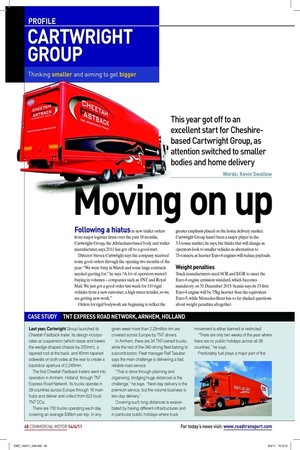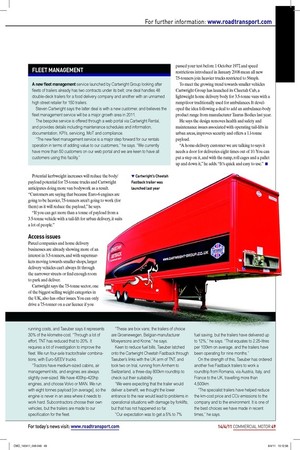CASE STUDY TNT EXPRESS ROAD NETWORK, ARNHEM, HOLLAND
Page 36

Page 37

If you've noticed an error in this article please click here to report it so we can fix it.
Last year, Cartwright Group launched its Cheetah Fastback trailer. Its design incorporates air suspension (which raises and lowers the wedge-shaped chassis by 200mm), a tapered roof at the back, and 40mm tapered sidewalls on both sides at the rear to create a backdoor aperture of 2,240mm.
The first Cheetah Fastback trailers went into operation in Arnhem, Holland, through TNT Express Road Network. Its trucks operate in 39 countries across Europe through 16 main hubs and deliver and collect from 523 local TNT DCs.
There are 700 trucks operating each day, covering an average 535km per trip. In any given week more than 2.25million km are covered across Europe by TNT drivers.
In Arnhem, there are 34 TNT-owned trucks, while the rest of the 340-strong fleet belong to subcontractors. Fleet manager Ralf Taeuber says the main challenge is delivering a fast, reliable road service.
“That is done through planning and organising, bridging huge distances is the challenge,” he says. “Next-day delivery is the premium service, but the volume business is two-day delivery.” Covering such long distances is exacerbated by having different infrastructures and in particular public holidays where truck movement is either banned or restricted.
“There are only two weeks of the year where there are no public holidays across all 39 countries,” he says.
Predictably fuel plays a major part of the running costs, and Taeuber says it represents 30% of the kilometre-cost. “Through a lot of effort, TNT has reduced that to 20%. It requires a lot of investigation to improve the fleet. We run four-axle tractor/trailer combinations, with Euro-5/EEV trucks.
“Tractors have medium-sized cabins, air management kits, and engines are always slightly over-sized. We have 400hp-420hp engines, and choose Volvo or MAN. We run with eight tonnes payload [on average], so the engine is never in an area where it needs to work hard. Subcontractors choose their own vehicles, but the trailers are made to our specification for the fleet. “These are box vans; the trailers of choice are Groenewegen, Belgian-manufacturer Moeyersons and Krone,” he says.
Keen to reduce fuel bills, Taeuber latched onto the Cartwright Cheetah Fastback through Taeuber’s links with the UK arm of TNT, and took two on trial, running from Arnhem to Switzerland, a three-day 800km roundtrip to check out their suitability.
“We were expecting that the trailer would deliver a benefit, we thought the lower entrance to the rear would lead to problems in operational situations with damage by forklifts, but that has not happened so far.
“Our expectation was to get a 5% to 7% fuel saving, but the trailers have delivered up to 12%,” he says. “That equates to 2.25-litres per 100km on average, and the trailers have been operating for nine months.” On the strength of this, Taeuber has ordered another five Fastback trailers to work a roundtrip from Romania, via Austria, Italy, and France to the UK, travelling more than 4,500km.
“The specialist trailers have helped reduce the km-cost price and CO2 emissions to the company and to the environment. It is one of the best choices we have made in recent times,” he says.









































